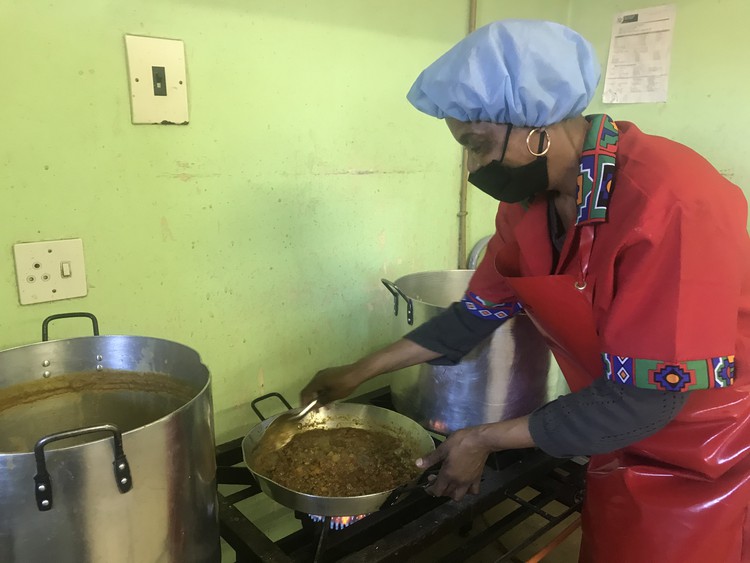“Some learners don’t get proper meals at home and come to school hungry”
How a special needs school in Gugulethu feeds over 300 learners daily
One of the volunteers preparing samp for learners at Nompumelelo Special School in Gugulethu last week. The school feeds over 300 learners per day. Photo: Tariro Washinyira
- Nompumelelo Special School in Gugulethu is one of 1,010 schools in Western Cape that receive meals daily through the National School Nutrition Programme.
- The school has 333 special needs learners aged 5 to 18.
- For many of these learners, the meal at school is the only food a child will eat that day.
- The school is still in need of donations of food and other items.
“Many of [our special needs learners] come from poor homes where caregivers are not working,” says Mlindeni Tubeni, principal of Nompumelelo Special School in Gugulethu, Cape Town.
Nompumelelo has 333 special needs learners aged 5 to 18, most of whom have severe intellectual disabilities. The school has 24 teachers.
Nompumelelo is one of 1,010 schools in the province that receive meals daily through the National School Nutrition Programme (NSNP). In most cases these meals are often the only food a child will eat that day.
Unathi Booi of the Western Cape education department said 473,174 learners are registered to benefit from the programme. “There is a general menu that is served to all learners. The menu is based on affordability and the guidelines provided by the Department of Basic Education. A NSNP appointed service provider delivers the dry food items to schools every week, while fresh produce such as fruit, vegetables and milk are delivered twice a week.,” she explained.
At Nompumelelo learners eat rice and tinned fish on Mondays, samp and beans on Tuesdays, rice and soya on Wednesdays, rice and tinned fish on Thursdays and samp and soya on Fridays. Each morning they get porridge with sugar and salt and every Wednesday they also get milk.
Tubeni said that parents are grateful for the meals which many of them cannot afford. “During school holidays the food scheme is closed. We identified 15 children that will be struggling to get meals. They will get packets to take home. We don’t want other children to know in case they will be teased, so we are discreet.”
He said that one of their main challenges was that the set meals do not always cater for learners with allergies. The school also does not have enough space for children to practice eating with a fork and knife as part of life orientation. Nor does the school have enough gas stoves to prepare the meals.
Puseletso Dyasi, who helps prepare meals at the school, said: “It motivates me to see the learners getting food. There are some learners who don’t get proper meals at home and come to school hungry. We also dish up food to take home for learners who stay alone.”
She and two volunteers start the day by soaking samp, peeling carrots and shredding cabbage. Before Covid-19 they used to start cooking after 6am but now they start at 8am. On arrival, they sanitise or wash their hands and have their temperatures recorded. As soon as the breakfast rush is done, the team starts preparing lunch which is served at noon.
“During lockdown we cooked for all learners from surrounding schools when our learners also collected from schools close to their homes. Some of our learners live as far as Philippi and Makhaza,” she said.
Dyasi said the school needs a gas stove, potatoes, vegetables, cooking oil, onions, beef stock to make the food tasty. “We are provided with cooking oil but it’s not enough. We also don’t have space to grow vegetables,” she said.
Support independent journalism
Donate using Payfast

Don't miss out on the latest news
We respect your privacy, and promise we won't spam you.
Next: Police accused of shooting pregnant woman in her own yard
Previous: Almost a century later, land claimants get back thousands of hectares of farm land and vineyards
© 2020 GroundUp. This article is licensed under a Creative Commons Attribution-NoDerivatives 4.0 International License.
You may republish this article, so long as you credit the authors and GroundUp, and do not change the text. Please include a link back to the original article.

